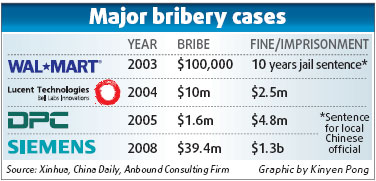Bribery Cases Prompt Call for Probe
Adjust font size:
Prosecutors have been urged to "seriously probe" the dealings of Chinese executives and officials who have allegedly become embroiled in a culture of bribery with foreign firms.
The move stems in part from the Rio Tinto scandal, in which four Shanghai-based employees for the world's second-largest mining company were arrested and charged for trade secret infringement and bribery.
Chinese media have also in recent weeks exposed several other cases of State-owned companies and government institutions taking bribes from multinational firms to secure contracts for a wide range of products.
The latest case has seen China National Offshore Oil Corp (CNOOC), along with five other Chinese firms, accused of being involved in a US$4.8-million bribery case with United States-based valve manufacturers Control Components Inc (c).
An anonymous source at CNOOC told Xinhua News Agency on Saturday the company was "innocent" and that no members of the staff had received bribes from CCI or its sales agents.
The US Department of Justice said CCI had admitted its staff had given money to executives in South Korea, Malaysia and the United Arab Emirates, as well as staff at six Chinese State-owned firms, which also included Petro-China, Jiangsu Nuclear Power Corp, Guohua Electric Power, China Petroleum Materials and Equipment Corp, and Dongfang Electric Corp.
As of last night, none of the companies had made any statement concerning the allegations.
But Chinese government advisers on anti-corruption yesterday urged prosecutors to carry out "serious investigations" into the enterprises.

"There have been just a few instances of further prosecutions but, in most cases, prosecutors have folded under pressure and in the face of difficulties surrounding their independent investigations," said Jing Yunchuan, chief lawyer at Gaotong Law Firm in Beijing and legal adviser to a number of State-owned firms.
Ren Jianming, an anti-corruption adviser and dean of the anti-corruption research center at Tsinghua University in Beijing, added: "Unless the central government backs follow-up investigations into those allegedly taking bribes from foreign firms, prosecutors still tend not to go further."
China Daily was unable to contact a spokesperson for the Supreme People's Procuratorate yesterday, while a spokesman for CNOOC declined to comment.
Of the 500,000 suspected corruption cases probed in China over the past decade, 64 percent involved international trade and foreign business, according to a recent report published by Anbound, a Beijing-based consultancy firm.
No information was available on how many ended in prosecution.
(China Daily August 17, 2009)